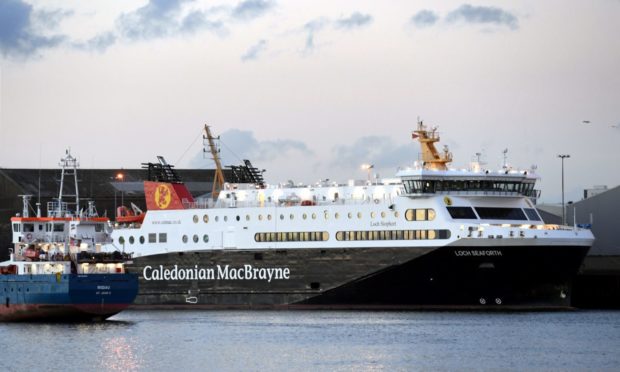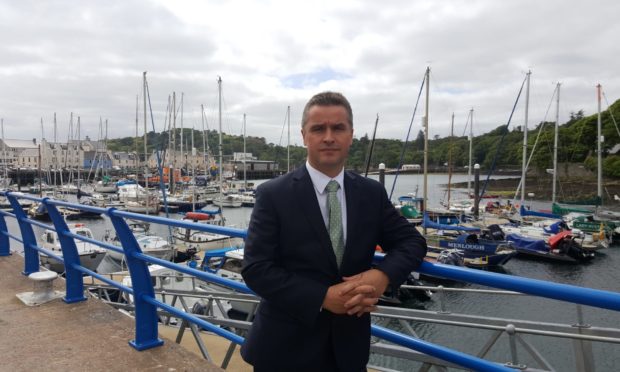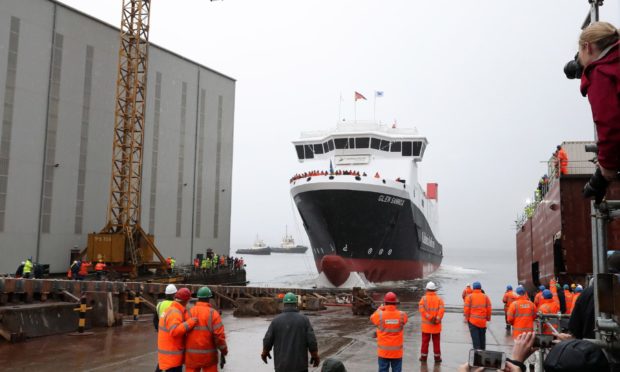Poland could be the answer to the west of Scotland’s ferry woes, a politician has suggested.
Western Isles MP Angus MacNeil was speaking as CalMac announced the latest delays in the repair of the Loch Seaforth vessel.
The ferry which runs between Stornoway and Ullapool suffered a major breakdown last month.
Initially it was hoped the vessel may be back in service by the beginning of May.
Later on, the earliest date for its return was given as May 21 and tonight, this was pushed back again until May 29.
Vessels have been moved around the network to cover for the ferry which is out of service, resulting in a knock-on effect with services stretched throughout the isles.
‘Frustrating news’
Specialist engineers working on Loch Seaforth have reported that more work must be carried out to her engines and crankshaft.
Temporary changes to vessels across the network will remain in place for the time being.
CalMac managing director Robbie Drummond said: “This is frustrating news, as we were expecting to see the Loch Seaforth return to service sooner than this.
“We will continue to work closely with customers to keep them updated of the latest situation and to minimise further disruption.”
Mr MacNeil said that all possible options need to be investigated to fill the islands’ ferry problems.
He is suggesting that another boat be built in Gdansk to join the fleet of CalMac vessels.
He said: “The MV Loch Seaforth was built in Germany and launched seven years ago and is currently out of service, having had numerous problems since coming into service.
“The newest boat previous to that, MV Finlaggan, launched 11 years ago, was built in Gdansk in Poland.
“We need to get other boats in play sooner rather than later.
“The problems on the Clyde are well documented, there are many promises but it seems that nobody in Transport Scotland, CMAL or CalMac are confident of when the Glen Sannox might arrive to ease the problems.
“The CalMac fleet is ageing.
“Perhaps given the number of boats that are going to be needed consideration should be given to going back to Gdansk where the Finlaggan was built or to Flensburger in Germany. Other boats will be required even if the Glen Sannox and Hull 802 are completed.”
The contract for Glen Sannox and an unnamed vessel known as hull 802 – was awarded in 2015, a year after businessman Jim McColl stepped in to rescue Ferguson, the last commercial shipyard on the River Clyde.
The first ship was meant to enter service on the Arran route in the summer of 2018 but is now expected to be ready in the summer of 2022.
Hull 802, destined for an Outer Hebrides route, is still being built on the slipway. The latest estimated cost for both ships is just short of £200m.
Mr MacNeil believes Poland could be best placed to help with a solution.
He said: “The Finlaggan cost in the region of £25million in 2010 and it was suggested at the time that Gdansk could have built another one for about 85% of that cost, having familiarised themselves with the job, however, I’m sure that is not the case today.
“The Loch Seaforth was £42 million four years later, it was indeed a bigger boat but one way or another we are going to need quite a number of boats over the next few years.
“Unfortunately, with the current problems we have we are probably going to need quite a few yards building and therefore it may be time to look to Poland or other ship building nations to provide the vessels we need.
“We will need a number of vessels if we are going to prevent further summers of restricted capacity due to the ageing fleet and the problems this brings.”
He added: “We should be using yards with a track record in building this kind of ship.”
A spokesman for Transport Scotland said: “Vessel deployment is a matter for CalMac, who have been working to find ways to continue the freight and passenger service to the Western Isles, we will continue to work with them to assess all options available.
“CalMac strives to minimise the time that a vessel may be unavailable and seeks to make the best decisions to balance the needs of communities across the network.”
A spokeswoman for CMAL, which owns ferries, piers and harbours on behalf of Scottish Ministers, said: “CMAL is very clear that vessel replacement is required and that it should be accelerated – this is fully explained in our recently published corporate plan.
“This has been recognised by Scottish Government and has been backed by their five year infrastructure plan, which commits £586m in capital from 21/22 to 25/26 regarding both vessels and port assets.
“Any new vessels will be procured through a full, competitive, open and transparent European tendering exercise.
“This will be carried out in accordance with the statutory requirements of the Public Contracts (Scotland) Regulations 2014 and Scottish Government Public Procurement Handbook.”


